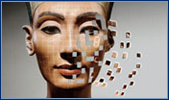|
|
 |
|
|
|
Principles of the digital Cultural Content Forum: The Evolution of the DCCF Principles At the Forum's meeting in Los Angeles in February 2006 the twenty-five participants from across the globe recognized the need to identify shared principles that could serve to shape future DCCF programs and define expected outcomes of meetings. As a result a set of principles was developed following the meeting and a preliminary draft circulated for comment from all attendees. At the 2007 meeting of the DCCF, held in Montreal in late April, the participants considered again the draft dCCF Principles and approved them subject to some revisions in the light of their discussions.
The DCCF Principles The Digital Cultural Content Forum urges wide recognition of the vital importance of museums, libraries and archives within the emerging knowledge society and their central role in supporting learning and education for everyone at every stage of their lives. Museums, libraries, archives and other collecting institutions are essential knowledge repositories as well as developers of the raw materials of future knowledge. These institutions therefore have a social responsibility to create maximum access to their knowledge resources. The Forum recognizes this responsibility through the following seven principles: 1. ACCESSIBILITY: Content holders must make a strong commitment to making their collections and skills available as widely and as easily as possible to support learning and creativity; 2. COLLABORATION: Content holders should work together to provide integrated access to their collections through partnerships with other cultural heritage institutions, with media channels and other education and learning institutions to maximise use and reuse of their knowledge resources and to provide maximum value for users; 3. INTEROPERABILITY: Content holders should support and deploy architectures, protocols and standards to ensure that their digital content interoperates with other services and collections. Architectures must be sufficiently flexible to accommodate digital content from a variety of sources (including different types of cultural heritage organizations, individuals and communities), and should provide seamless access for end users while preserving provenance information for documentation purposes; 4. SHARING EXPERIENCE: Demonstrations of collaborations and partnerships should be developed within countries and internationally in order to make explicit the public value and social impacts of the knowledge resources embodied in museums, libraries and archives; best practices and lessons learned should be widely disseminated to advance the state of the art and promote continued development; 5. SUSTAINABILITY: New models of business sustainability should be developed and tested, including the development of metrics for social impacts. 6. FOCUS ON THE USER: Content holders must consider carefully at all times the needs and abilities of the widest range of current and potential users in the design and exploitation of systems. As far as possible, digitised resources should be presented in a range of contexts and services, actively engaging with social networking and enabling users to contribute their expertise. 7. VALUING INSTITUTIONS' HUMAN CAPITAL: Content holders must recognise that the skills and energy of their staff and the organisational culture are fundamental components in the successful creation and deployment of digital cultural content To download the Principles in PDF please click here |
